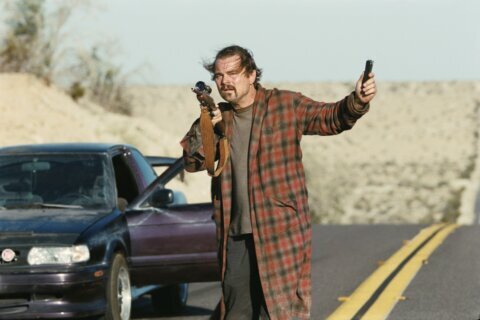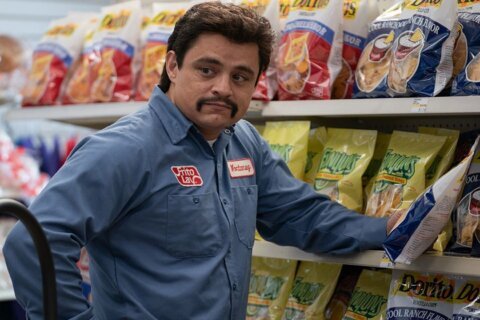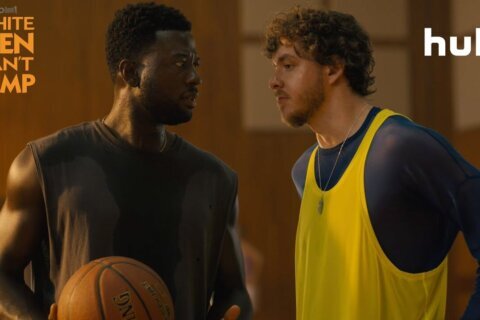WASHINGTON — Marvel has gotten plenty of movie mileage out of polished, known characters such as Iron Man, Thor, The Hulk and Captain America.
Out Aug. 1, it pivots away from the “Avengers” group and assembles a new band of scrappy, snarky superheroes: “The Guardians of the Galaxy.”
Marvel’s new motley crew exists in a “Star Wars” realm, but the film carries the mocking attitude of “Spaceballs.”
Its mission: prevent a powerful, planet-destroying orb from falling into the hands of the evil alien Ronan the Accuser. Its motto: “Something good. Something bad. A bit of both.” You could say the same thing for the movie.
Let’s start with the good, which fortunately outweighs the bad.
“Guardians” is at its absolute best during the side-splitting banter and bickering of its superhero quintet, which miraculously overshadows the Oscar-caliber talent of Glenn Close, Benicio Del Toro and John C. Reilly.
“Fast and Furious” star Vin Diesel steals the show as the “slow but furious” Groot, a talking tree with big muscles and a limited vocab. He knows just two words, “I’m Groot,” leaving Bradley Cooper’s raccoon Rocket to interpret as a sort of snarky C-3PO deciphering R2D2’s inaudible beeps.
They’re a buddy team with genuine affection, but different sensibilities. The giant Groot has the innocence of a child, while the tiny Rocket is the jaded adult. Of all the Guardians, he is the most guarded, with Cooper lashing out just as much as he did in “Silver Linings Playbook.”
There is no obvious Chewbacca parody, but that slot is most likely filled by Drax, a massive brute vowing revenge for the death of his family. The role is perfectly played by former WWE champion Dave Bautista, a D.C. native who mines big laughs with a meathead approach that takes every comment literally. Metaphors go right over his head as he tries to catch them. He may not smell what The Rock is cooking, but he’ll likely lay the box office smackdown on “Hercules” (2014).
Countering the testosterone is actress Zoe Saldana, who trades her Na’vi blue face paint for Gamora green as a righteous, butt-kicking assassin. Her character serves as the Princess Leia- style love interest, but she’s far more capable of holding her own without the need for a gold bikini. What a blockbuster decade it’s been for Saldana — from Anamaria in “Pirates of the Caribbean: The Curse of the Black Pearl” (2003), to Neytiri in “Avatar” (2009), to Uhura in “Star Trek” (2009).
This entire band of misfits is led by Peter Quill (Chris Pratt), who was abducted from Earth in 1988 Missouri and raised by thieves known as Ravagers on the planet of Morag. He’s a mix of Luke Skywalker and Han Solo, going by the alias “Star Lord” and fancying himself as a Harrison Ford style outlaw. Grieving the death of his mother, he jams out to an ’80s mix tape and makes pop culture wisecracks from “Ninja Turtles” to “Footloose.” We’re never more than six degrees from Kevin Bacon.
It’s about time Pratt gets a leading role, after appearing in TV sitcoms such as “Parks and Recreation” and movies such as “Moneyball” (2011), “Her” (2013) and “Zero Dark Thirty” (2012). Kathryn Bigelow’s Bin Laden hunt continues to grow in stature, with two of its stars landing blockbuster leads this summer: Pratt here and Jason Clarke in “Dawn of the Planet of the Apes” (2014).
Which brings us to the bad, or let’s say, disappointment for what could have been so much more.
“Guardians of the Galaxy” feels thematically weak compared to “Dawn of the Planet of the Apes,” which offered a powerful commentary on war and peace and remains the summer’s best blockbuster. Marvel is certainly capable of this, warning against NSA spying in “Captain America: The Winter Soldier” (2014) and speaking up for mutant minorities in “X-Men: Days of Future Past” (2014). Without this sort of thematic backdrop, “Guardians of the Galaxy” feels like the third-best superhero flick of the year, its entire soundtrack bested by a single scene of Jim Croce’s “Time in a Bottle” in “X-Men.”
That’s not to say “Guardians” doesn’t have a great soundtrack. Audiences will sing along to the string of hits: Rupert Holmes’ “Escape (The Pina Colada Song),” Redbone’s “Come and Get Your Love,” Blue Swede’s “Hooked on a Feeling,” The Five Stairsteps’ “Ooh, Child,” The Raspberries’ “Go All the Way” and Elvin Bishop’s “Fooled Around and Fell in Love.” Wall-to-wall music can work wonders, as in David O. Russell’s “American Hustle” (2013), but when it’s combined with derivative dialogue, the whole thing begins to feel overstuffed with pop-culture homages. Somewhere along the way, Marvel adopted the misguided notion that clever references can substitute for original dialogue.
Call it the Joss Whedon Effect. The director found great success with this approach in “The Avengers,” but several movies later, it’s bordering on self-parody. There’s such a tendency to “wink wink, nudge nudge” that you’ll feel like you’ve been elbowed in the ribs. This sort of post-modernism was fresh and exciting in the days of “Shrek” (2001), but I wonder whether it’s now past its prime.
You’ll also have to put up with other tired bits of the Marvel formula.
This includes the one-dimensional villain, in this case Ronan (Lee Pace), who falls into a long line of forgettable Marvel baddies, with the exception of Tom Hiddleston’s Loki and Ben Kingsley’s Mandarin. Pace is a talented actor, with two Golden Globe nominations to his name, so it’s a shame the script doesn’t do more to flesh out his character. He may answer to a wrinkled superior resembling Emperor Palpatine — Josh Brolin’s brilliantly realized super-villain Thanos — but there’s nothing unique about Ronan’s character, who vanishes as a mere gasp amid Darth Vader’s enduring breaths.
Ronan’s lack of development makes our 3D eyes glaze over each time we enter the dark alien world, almost as much as discussion of the film’s object of affection, The Orb, which might as well be the Tesseract from “The Avengers” or the AllSpark from “Transformers.” Coveted objects can work as MacGuffins, such as the microfilm in “North By Northwest” (1959); mystical artifacts, such as the Ark of the Covenant in “Raiders of the Lost Ark” (1981); or ironic symbols of greed, such as the black bird in “The Maltese Falcon.” In the hands of Marvel, however, they all too often lead to overdone climaxes with CGI explosions, undermining the gritty goodwill that “Guardians” has built for the first two acts.
Perhaps Marvel’s biggest ongoing problem is a lack of respect for the sanctity of life. Unlike HBO’s “Game of Thrones,” where we fear that anyone could go at any moment, Marvel routinely undermines any true feeling of danger by resorting to fake deaths (Don’t worry, no “Guardians” spoilers here).
Let’s stroll down Marvel memory lane. In “The Avengers” (2012), Agent Coulson was murdered, only to resurrect on TV’s “Agents of S.H.I.E.L.D.” In “Iron Man 3” (2013), Pepper Potts falls to her apparent death, only to return moments later. In “Thor: The Dark World” (2013), Loki comes back from the dead. And most recently, in “Captain America: The Winter Soldier” (2014), Nick Fury fakes his own death to help Steve Rogers combat The Winter Solder, which is revealed to be Bucky, who is also brought back from the dead. This is nonsense. Characters must be allowed to die. But I suppose when your goal is to pander, it seems what’s good for the “Top Gun” Goose isn’t good for the Marvel gander.
It’s clear Marvel studio executives don’t want to mess with the movie formula when there’s so much money to be made. And in this climate, it’s a mini-miracle that director James Gunn has created something so irreverent. There’s a scene where Pratt serves as a proxy for Gunn in this regard, flipping the bird to the authorities by cranking an invisible lever that extends his middle finger.
“Oh, I’m sorry,” he says, “I don’t know how this machine works.”
Hardly. Gunn knows exactly how the Marvel machine works.
The director realizes that the only way to create something even a tad original within such a tired formula is to mock its own cliches. To paraphrase John C. Reilly’s renovation speech at the end of the film, Gunn tries to create something new, while salvaging what he can from the rest. And in doing so, he provides a Rupert Holmes summer “Escape” from “a worn-out recording of our favorite song” that had “fallen into the same old dull routine.”
Who knows if he’s into yoga, or likes pina coladas, but thankfully, he has half a brain.
Write to him and escape.
★ ★ ★
The above rating is based on a 4-star scale. See where this film ranks in our Fraley Film Guide. Follow WTOP Film Critic Jason Fraley on Twitter @JFrayWTOP, read his blog The Film Spectrum, listen Friday mornings on 103.5 FM and see a full list of his stories on our “Fraley on Film” page.
Follow @WTOP and WTOP Entertainment on Twitter and WTOP on Facebook.








